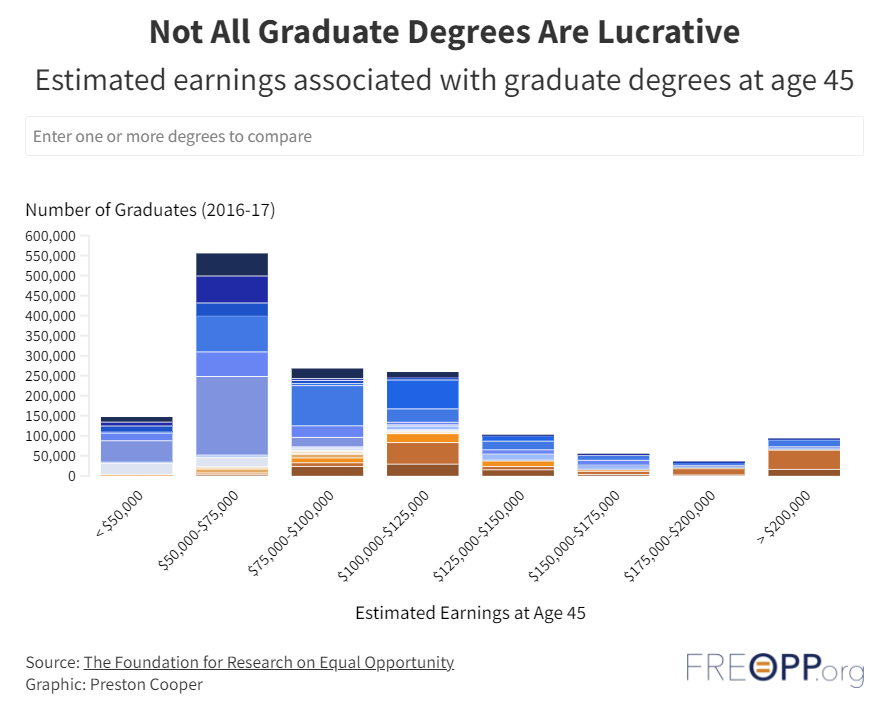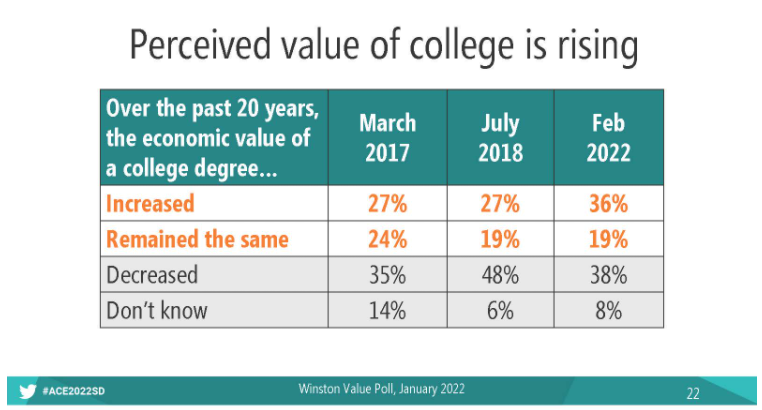Commentary
Given recent world news, I have found it a bit hard to concentrate on the details of higher education research. Just as we seem to be emerging from the pandemic, the Russian invasion of Ukraine has thrown the world back into turmoil. My focus has shifted
to the impact on their educators and the learners they serve.
AACRAO Research Update
Two New AACRAO Research Advisory Board Members
The AACRAO Research Advisory Board welcomes two new members with the additions of Gavin Hamms and Henrietta Romero this month. Their knowledge and professional expertise will add to the board’s work in guiding research. Their bios are below.
| Gavin R. Hamms is a native of Winnfield, LA. He obtained his bachelor’s in business management from Grambling State University in 2010. In 2012, he acquired his M.B.A. from the University of Louisiana at Monroe. After beginning
his career in higher education as the manager of default prevention at Grambling State University in 2011, he pursued a Ph.D. in urban higher education. While working on his Ph.D., he accepted a promotion to serve as the Director of
Financial Aid at his alma mater, where he streamlined and enhanced student services. Dr. Hamms receives wide recognition for his passion for serving students and improving process efficiencies. |
Dr. Hamms received his Ph.D. in urban higher education from Jackson State University in 2016. His dissertation title was “Institutional Factors that Influence Student Loan Default at Historically Black Colleges and Universities.” He has
used his research to help develop financial literacy initiatives for student success. While serving in financial aid, Dr. Hamms developed a unique understanding of enrollment management and student success. He has utilized his knowledge of financial
aid to help his institution grow enrollment and provide access for marginalized populations. His highly-respected skillset led him to designation as the Strategic Enrollment Management Council chair. Grambling State University selected him as
the Associate Vice President of Enrollment Management from that appointment. Dr. Hamms is a proud member of Kappa Alpha Psi Fraternity and is passionate about empowering, educating, and encouraging the masses.
Dr. Henrietta Romero has been in higher education for nearly 20 years. She returned to New Mexico Highlands University two years ago as the University Registrar after being the registrar at Luna Community College. Dr. Romero is active
in professional organizations, including AACRAO, RMACRAO, and NMACRAO, and has established a professional working relationship within the organizations. Dr. Romero is an NMHU and NMSU alum, receiving her bachelor’s in business
administration with cum laude honors, master’s in educational leadership, and doctorate in educational leadership and administration. | |
She continues to thrive in higher education in the Northern New Mexico area, collaborating with various departments, institutions, and organizations to better all students.
Academic Operations and Student Success
The survey, underwritten by Coursedog, benchmarks academic operations and student success, closed on March 18. More than 300 undergraduate-serving respondents completed the survey. Thank you all. There will be a draft of the report
in the next few weeks and then sent on for editing and design work. We anticipate the report will be ready by early June; at this time, we will also host a webinar.
April 60-Second Survey - Graduate and/or Professional Strategic Enrollment Management
A group of higher education researchers and AACRAO members have asked us to survey the membership about graduate and/or professional student strategic enrollment management efforts. The results of this survey will help shape their future research.
If you complete the survey, you will be given the opportunity to volunteer for their future research on the subject. This survey will deploy on April 4.
Current Higher Education Research and Related Topics
New Report Examines whether Graduate Degrees are Worth the Cost
A new report published by the Foundation for Research on Equal Opportunity examines the return on investment of graduate degrees. The study included an examination of nearly 14,000 graduate degrees. The report contains a searchable table that shows estimated earnings for graduate programs by institution and degree. Key
findings in the report include:
- The value of a master’s degree is highly dependent on the field of study.
- Many master’s degrees are not suitable investments.
- Advanced degrees pay off—but their growth is stagnant.
- 40% of master’s degrees have no net financial value at all.
- The most lucrative graduate degrees are professional programs in law and medicine, followed by STEM degrees.

New Survey Shows the Need for Financial Literacy Education
The latest version of the Student Voice survey from Inside Higher Ed and College Pulse reveals that many students need education in financial literacy. The survey of 2,000 undergraduate students shows that many students struggle with
their finances. Key points include:
- More than three-quarters of the students surveyed will have student loan debt after graduation.
- Credit cards and car loans were the following most common types of debt.
- 1/4 of students experience food insecurity, and 1/6 of students have dealt with housing insecurity during college.
- Nearly 65% of students were worried or very worried about having to drop out of college due to an unexpected financial expense.
State Support for Incarcerated Students Examined in a New Report
The report by the Education Trust looks at how eight states support students in their
correctional systems. Policy change recommendations address issues found. The study included an evaluation of each state based on several different policy criteria:
- Does the state offer financial aid to current and formerly incarcerated students?
- Does the state provide sentence reduction credit for incarcerated students enrolled in higher education courses?
- Does the state provide incentives and resources to colleges that enroll and support current and formerly incarcerated students?
- Does the state have a streamlined process for currently incarcerated students to access documents to retrieve their state identification?
- Does the state allow formerly incarcerated students to access federal support for basic needs like food, housing, and health care?
- Does the state ban higher education institutions from asking about criminal history on admissions applications?
- Does the state ban employers from asking about criminal history on job applications?
- Do currently and formerly incarcerated individuals have the right to vote in the state?
Public confidence in higher education improved slightly
| A new article from Inside Higher Ed discusses a survey of registered voters sponsored by the American Council on Education. The survey shows a slight improvement in the public perception of higher education. In addition to generally raising confidence, the perceived value of college
is also on the rise after recent years of decline. The survey also found that a strong political polarization exists, with Democrats viewing the importance of college at a much higher rate than Republicans or independents. |  |
New Webinar on Financial Literacy Available
A new webinar from AIG and Higher Ed Dive examines the best financial
literacy and education practices. Topics in the webinar include:
- Why financial literacy had come under fire and how research findings refute misconceptions.
- How a new study examines the effect of multiple financial education courses over four years.
- What educators should expect from financial education in affecting students.